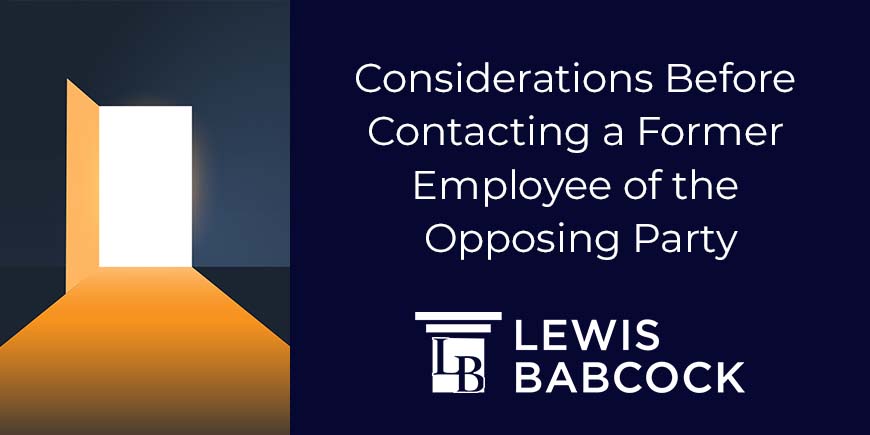|
You’ve lucked out, you think. While embroiled in a contentious business contract dispute, you’ve learned that a former high-level employee of the opposing party supports your understanding of how the original contract was negotiated and how the parties initially performed their obligations. Based on this, you believe she might be the key to concluding the dispute in your client’s favor.
However, experience tells you that no matter how supportive a witness is during casual conversation, things can quickly change and enthusiasm dampen under the pressure of a deposition. Normally, you can prepare your best witness to handle difficult questions and address the weak points of your case that will undoubtedly come out during a deposition. Your instinct is to reach out to the former employee, verify her position, possibly obtain an affidavit, and prepare her to handle difficult deposition questions, just like you would with any other witness. And yet, you wonder, is this too good to be true? Can I really reach out to a former employee of my adversary and prepare her to testify against them? Somewhere, deep down, ethics bells are ringing. Attorney-client privilege questions are beginning to germinate, and your professional responsibility professor’s grinning face flashes across your mind, which you know means, “It depends.” Do the Rules of Professional Conduct permit me to contact a former employee of the opposing party? In contentious litigation, you loath giving up any advantage that may tip the balance in your client’s favor. A former insider certainly could be such an advantage, so it is worth exploring the question of whether you can contact them. This question has three parts: (1) Can I contact a former employee of a represented party? (2) If so, are there any limitations? (3) Is it worth it? Part I – Is it Permissible? Assuming the former employee is not a party to the lawsuit and is unrepresented, intuitively, the answer should be “yes.” There is not a South Carolina Rule of Professional Conduct directly on point, but if you dig into Rule 4.2[1] - Communication With Person Represented by Counsel, you’ll find Comment 7, which addresses our question. In relevant part, Comment 7 states that for represented organizations: (1) Communication is prohibited with a [current] constituent [officer, director, employee, shareholder][2] who: a. supervises, directs or regularly consults with the organization’s lawyer concerning the matter; b. has authority to obligate the organization with respect to the matter; or c. whose act or omission in connection with the matter may be imputed to the organization for purposes of civil or criminal liability. (2) Consent of the organization’s lawyer is not required for communication with a former [officer, director, employee, shareholder]; (3) In communicating with a . . . former [officer, director, employee, shareholder] of an organization, a lawyer must not use methods of obtaining evidence that violate the legal rights of the organization. See Rule 4.4, Comment [2].[3] Comment 7 to Rule 4.2 answers our question. You can contact a former employee of a represented organization without permission from the organization’s attorney. Good news. Part II – Are there Limitations? There are other considerations before you proceed. South Carolina Bar Ethics Advisory Opinion 01-01 provides additional analysis of Rule 4.2 and concludes that an attorney may contact a former employee without violating Rule 4.2 if the contact is conducted in a manner consistent with other Rules, in particular Rule 4.3 - Dealing With Unrepresented Person, and Rule 4.4 - Respect for Rights of Third Persons. In short, compliance with Rules 4.3 and 4.4 may look like the following: Rule 4.3:
Rule 4.4:
These to-dos reflect that there is a real risk that former employees may not understand your role, may not grasp what they can and can’t tell you, and could accidentally provide confidential or privileged information, which could cause ethical problems for you and may impact your continued role in the litigation. Can you avoid running into attorney-client privilege matters if the employee was not an officer or director of the organization and was outside the organization’s “control group”? While the concept of control group persists, and it was mentioned in the comments to Ethics Advisory Opinion 01-01, at least in federal court the Supreme Court has squarely rejected the control group test in favor of a more granular analysis of whether the communications with the employee were made for the purpose of providing legal counsel to the organization. Upjohn Co. v. U.S., 449 U.S. 383 (1981). Following Upjohn, there is not a quick and easy test to determine whether a former employee has potentially privilege information, it all depends on the context of specific communications in which the employee took part. The Fourth Circuit Court of Appeals has applied this same analysis to communications between an organization’s legal counsel and former employees, meaning that if an organization’s attorney has contacted the former employee with whom you wish to speak, those communications could be privileged and should be avoided. In re Allen, 106 F.3d 582 (4th Cir. 1997). Practically, Rules 4.2, 4.3, and 4.4 likely place these same boundaries around former employees who have provided information for the purpose of the organization receiving legal advice. As such, the best course of action is to treat every former employee as potentially having had privileged communications and steer clear of these areas. Part III – Is it a Worth it? The final consideration is pragmatic and variable: Does it make sense in your unique situation? Do the benefits of communicating with a former employee outweigh the potential risks of opening yourself up to the scrutiny of opposing counsel, or possibly the court or disciplinary counsel? Particularly where the former employee was involved in the decision-making process that led to the dispute at issue in the litigation, is there truly a safe way to isolate only the facts known by that employee without reaching what the employee told, or was told by, counsel for the organization? There may be, but however successful you are in preparing the witness and avoiding the potential pitfalls, it seems almost certain that the other side will be aware of any contact you’ve had with the former employee and could turn it into a significant distraction. Can you do it? Yes. Are there limitations? Yes. Is it worth it? It depends. [1] Rule 4.2, RPC, Rule 407, SCACR. [2] Rule 1.13 Organization as Client, cmt 1. [3] Rule 4.2, cmt 7. Comments are closed.
|
Archives
August 2023
Categories |
|
|
|
© COPYRIGHT 2023 LEWIS BABCOCK L.L.P. ALL RIGHTS RESERVED.



 RSS Feed
RSS Feed





